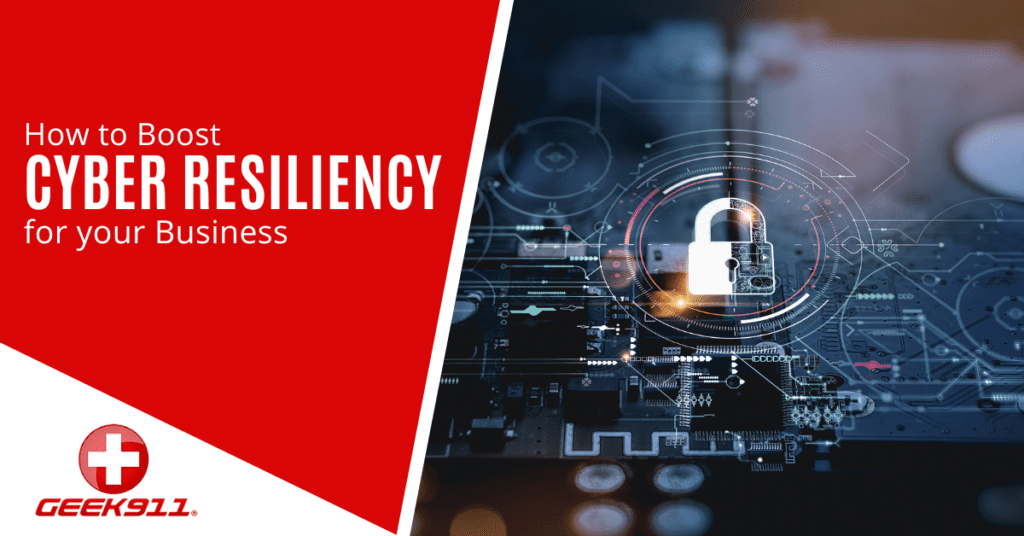How to Boost Cyber Resiliency for Your Business

Cyberattacks are increasing as the day goes by, and with an increasing reliance on digital assets and services, companies worldwide are concerned about disruptions to their business operations caused by cyber threats. The capacity to endure cyberattacks and continue functioning in adverse conditions has a stronger-than-ever connection to bottom-line company success.
Online threats are the major danger businesses face. Cyber attackers aim to acquire access to a company’s data in order to profit from it. No one wants their data to fall into the wrong hands or be disclosed to the public. In fact, data has become a virtual gold mine for bad actors.
According to Statista, It has been estimated that organizations and businesses face up to 58% of attacks yearly, with manufacturing accounting for over 23%, Finance and insurance accounting for 22%, and professional and business services accounting for nearly 13%.
As a result, cybersecurity is a major priority for organizations these days. The threat of advanced cyber assaults has never been greater. This is why it is critical to ensure that your IT systems can withstand any attack with the help of cyber resilience.
Why Cyber Resilience is Important
A cyber resilience strategy is critical for company continuity. It can provide benefits besides improving the organization’s security posture and lowering the risk of exposing critical information and infrastructure.
Cyber resilience also helps in the prevention of financial loss and reputation damage. If a company receives cyber resilience certification, it creates and boosts trust among the business’s partners, clients, and customers. Furthermore, a cyber-resilient organization can help optimize the value your business provides for its consumers and improves its competitive edge through effective and efficient operations.
How Can Businesses Improve Their Cyber Resilience?
Businesses must ensure they have the right people, technologies, and security features to protect themselves against cyberattacks. To maintain operational continuity, your business must strengthen its cyber resilience and protect itself from cyberattacks.
Your business can boost its cyber resilience through the following:
Cybersecurity Audits
Cybersecurity audits are important tools to determine the efficacy of a company’s cybersecurity posture. Cybersecurity audits help your business make proactive efforts to lower the risk of being compromised by cyberattacks by identifying gaps and areas for improvement.
Furthermore, by providing independent and objective evaluations, cybersecurity audits can help to build trust among stakeholders in an organization’s cybersecurity measures. As the threat landscape develops and new technologies emerge, it is becoming increasingly vital for your business to undertake comprehensive IT security audits regularly. Doing so guarantees that your defenses are up-to-date and effective against the most recent threats.
Cyber Insurance
As cyber assaults become more prevalent, organizations are increasingly trying to protect themselves against the financial effect of an attack. Cyber insurance can help cover repairs and any legal fees that may be incurred.
It is critical to stay informed on cybersecurity risks as they change. This might include attending conferences and seminars, reading industry publications, and subscribing to cybersecurity news feeds. By staying up to speed on the newest developments, you can guarantee that your company is better prepared to deal with any possible challenges.
Two-factor Authentication
Without two-factor authentication, your password is enough for hackers. As a result, getting 2FA activated is essential. Before logging in, you must either input a unique one-time code or receive a push notification to log in.
When a login attempt is made, a notification is generally sent to a linked mobile phone, which means that if someone steals your password, they won’t be able to access the account unless they have direct access to your second form of authentication. This is one of the best ways to boost cyber resiliency.
An Effective Backup Strategy
Reviewing data backup strategies is crucial, so operational continuity is assured thanks to backups in the event of a cyberattack. There is also a 3-2-1 rule for backups, which demands having three copies of the data, both saved locally on different media types and the third off-site, such as on the cloud. This method is beneficial in a cyberattack or data breach.
Enlightening Employees about Cyber Security
Every company should educate its employees and staff members about cyber security through regular staff awareness training programs and informative lectures. By giving employees the tools and information they need to stay safe, they can help to protect the company’s data and reputation. In addition, employees can play important roles in cybersecurity by reporting suspicious activity and following best practices for password protection and internet usage.
Restricting Access to Internal Networks
Third-party access to internal networks and systems should be restricted permanently. It is the IT team’s responsibility to regularly check the internal networks to ensure that there are no attackers. If a third party needs to connect to the internet, they should do so via a guest network rather than the principal network. This prevents any third party from compromising your network or gaining access to your company’s data
Take Action before it’s too Late!
Cyber resilience is a business’s ability to prevent, withstand and recover from cyber incidents. Don’t wait until the damage is done before securing your organization’s data.
If you need more assistance to make your business cyber-resilient, you can reach GEEK911 via 1-866-433-5411 or send us a message.
